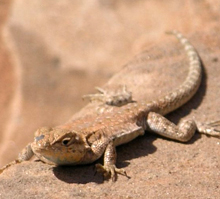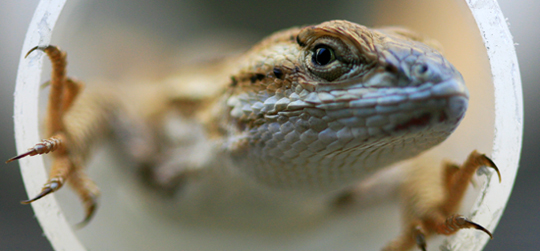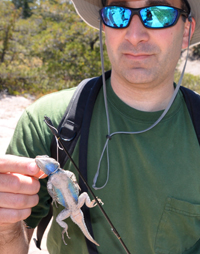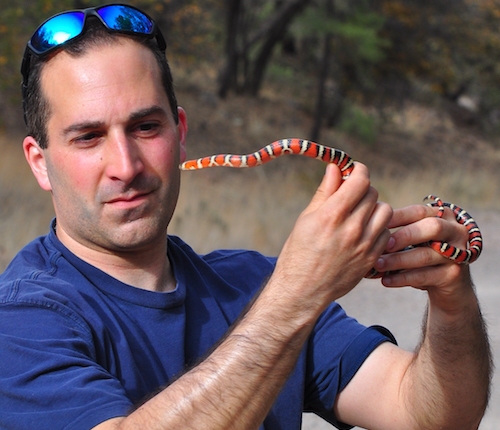
show/hide words to know
Some lizards begin their morning by sitting in a sunny spot on a rock. These lizards aren’t being lazy – they are just getting ready for the day! Unlike you, lizards don’t make enough heat to stay warm, so they rely on their environment for warmth. Sun-bathing is just the fastest way for a lizard to warm up so that its muscles work properly.
Sun bathing on a warm rock helps lizards warm up on chilly mornings.
Temperature is important to all organisms, including you. On a blazing summer day, you probably look for a shady spot under a tree. In the cold winter, you might look forward to a nice, hot shower. Just like you cool down or warm up to feel more comfortable, many animals have their own preferred temperature (a temperature at which they like to keep their bodies).
Professor Angilletta studies the thermal biology of animals, which means that he investigates how different temperatures affect them. So far, he has spent a lot of time testing how well animals can capture prey, digest food, run, grow, and survive at different temperatures.
Angilletta uses special chambers in the lab to control temperature and study how it affects the lizard inside.
Long poles and string are used to capture lizards in the wild.
By studying how temperature affects these organisms, biologists can come up with plans to keep these plants and animals around for centuries to come. For example, Angilletta really likes to eat salmon, and salmon are very sensitive to changes in temperature. “I want to be able to eat salmon for the rest of my life,” he explains.
Even though all animals are affected by temperature, it is easiest to study how temperature affects animals by studying those that rely on the environment for warmth – such as lizards.
These little animals are also interesting to watch because they differ from people in a lot of ways, including going days without eating and even longer without drinking water. When they do eat, they often swallow their food without even chewing it! But, lizards are similar to some people in at least one comical way – some males do push-ups to impress the females.
Angilletta feels lucky to have a job where he gets to have fun working with these amazing animals, all the while helping to make the world a better place for both lizards and people.
This section of Ask A Biologist was funded by NSF Grant Award number EF-1065638.
View Citation

Mike Angilletta began his career in biology because of an interest in snakes. Here he holds a harmless kingsnake that looks very similar to a venomous coral snake. Check out how Angilletta maps the future of some reptile species.
Be Part of
Ask A Biologist
By volunteering, or simply sending us feedback on the site. Scientists, teachers, writers, illustrators, and translators are all important to the program. If you are interested in helping with the website we have a Volunteers page to get the process started.







